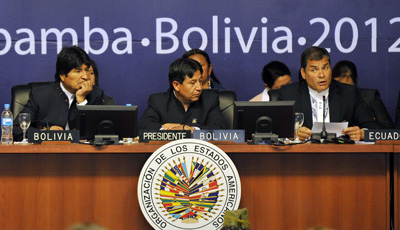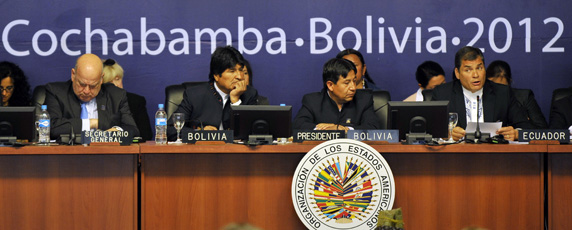A system to defend free expression is under attack from foes and former allies. By Carlos Lauría

How the Americas Failed Press Freedom
By Carlos Lauría
Ecuadoran President Rafael Correa descended on the 42nd general assembly of the Organization of American States in Cochabamba, Bolivia, with a show of force and a determination to shatter precedent. Arriving with a delegation of several dozen Ecuadoran officials, Correa was the only head of state besides the host, Bolivian President Evo Morales, to attend the OAS assembly, traditionally a gathering of foreign ministers. But merely breaking protocol was not his goal.

Shouldering aside what was supposed to be the assembly’s main agenda item, food security, Correa blasted the human rights arm of the OAS and urged the organization’s 34 member states to enact drastic changes. “Neocolonialism is over,” he declared in a confrontational, hour-long speech that cast the Inter-American Commission on Human Rights (IACHR) and its special rapporteur on freedom of expression as foreign policy tools of the United States that trample on the sovereign decisions of member states.
That Correa and an allied OAS bloc would make such a case was not surprising. The Ecuadoran president has been at odds with the commission ever since it denounced his use of criminal libel laws to retaliate against critics in the press. But Correa accomplished far more. He and his allies won preliminary decisions that could gut the system that protects human rights and press freedom. And he did it with the tacit support of regional heavyweights such as Brazil.
“It is extremely grave that a group of countries with serious human rights and institutional problems are seeking to dismantle the Inter-American system,” said Santiago Cantón, who served as the human rights commission’s executive secretary until leaving office shortly after the June 2012 Cochabamba assembly. “Countries that should be leading the defense of the system–Brazil, Argentina, Colombia, and Peru–unfortunately are not doing so for various reasons,” said Cantón, who now directs the Robert F. Kennedy Center for Justice and Human Rights.
In sum, the Ecuador-led bloc won initial approval for a series of changes that would prevent the rapporteur’s office from publishing in-depth reports on freedom of expression, bar it from seeking independent financial support, and place it under greater control from member states. The changes are part of a broader overhaul of the IACHR’s mandate that will come before the General Assembly for debate in 2013. As now outlined, the overhaul would limit the commission’s ability to issue recommendations, known as precautionary measures, that call on member states to take immediate, corrective action in cases of grave human rights abuses.
Although in theory the plans could be derailed, many analysts believe some dismantling of the human rights system is inevitable. “The commission’s autonomy suffered a big blow,” said Peruvian journalist Ricardo Uceda, executive director of the regional press group Instituto Prensa y Sociedad, or IPYS. Under the plans, he said, the very governments being monitored for potential human rights violations would be allowed to set the terms of the monitoring. “From now on,” Uceda said, “governments will be able to grab scissors and make custom-tailored suits.”
Throughout its long history, the OAS human rights system has served as the last line of defense for citizens facing abusive treatment throughout the hemisphere. It has intervened directly in cases of imminent danger–ordering governments to provide security for threatened journalists, for instance–and issued in-depth reports that shine a light on systemic human rights abuses. Widely seen as an international model, the commission and its rapporteur have upheld such fundamental democratic principles as due process, separation of powers, and freedom of expression.
Yet the human rights system did not simply fall victim to an aggressive onslaught by regional leaders who oppose its core mission. It was also left undefended by other regional leaders who had individual grievances with commission decisions and who appeared dissatisfied with the commission’s recently expanding portfolio.
The charge to weaken the system was led by Ecuador and the bloc known as the Bolivarian Alliance for the Americas or ALBA, which also includes Venezuela, Bolivia, Nicaragua, Cuba, Dominica, Antigua and Barbuda, and Saint Vincent and the Grenadines. At the Cochabamba meeting, the ALBA members threatened to pull out of the human rights body if it was not restructured to their liking (and, in fact, Venezuela announced its withdrawal from the American Convention on Human Rights in September 2012). Several ALBA countries have poor press freedom records. Correa’s government, for example, has enacted a series of laws to restrict free expression, smeared critics as liars, and filed criminal cases against detractors. Many of his actions mirror ones taken by the Venezuelan government of Hugo Chávez. Cuba has among the harshest anti-press laws in the world, while the Bolivian and Nicaraguan governments have fashioned policies adversarial to journalists.
The sort of proposals promoted by Ecuador and the ALBA bloc would normally have been examined by the IACHR itself, which would then make its own decision whether to adopt them. The process is designed to insulate the IACHR from political pressures brought by member states that, invariably, come under criticism from the commission from time to time.
But in Cochabamba, ALBA took advantage of member states’ weakening support for the human rights system, persuading the General Assembly to allow its proposal to move forward outside the usual review process. Instead of having the IACHR make its own determination, the OAS Permanent Council, made up of ambassadors from member states, has been charged with drafting a statutory overhaul that will encompass the ALBA recommendations. The full General Assembly is scheduled to take action on the overhaul in March 2013.
ALBA also exploited the OAS practice of deciding issues by consensus, rather than by roll-call voting. Only Costa Rica, the United States, and Canada went on the record in Cochabamba defending the human rights system and urging that the ALBA proposals go through the normal review process. Other nations were effectively silent–and their silence amounted to support for the Ecuador-led plan.
Most notable in its failure to defend the system was Brazil–whose leaders were still angered by a 2011 IACHR ruling that called on President Dilma Rousseff‘s government to suspend construction of the Belo Monte dam in northern Brazil. Scheduled for completion in 2015, the $17 billion hydroelectric project had been a source of controversy since indigenous communities and environmental activists argued that it could flood an estimated 195 square miles of Amazonian rain forest and displace thousands of people. Officials disputed the contention and countered that the dam would provide electricity for 23 million homes.
In its decision, the IACHR found the Brazilian government had not properly consulted with indigenous groups and recommended it take steps to protect local tribes and make environmental and social impact statements available in local languages. An angry Rousseff, who had overseen the project as energy minister before becoming president, suspended Brazil’s annual contribution to the OAS in 2011 and withdrew the country’s OAS ambassador. (Brazil also ignored the IACHR’s recommendations, although a domestic federal court halted dam construction in August 2012 on similar grounds that indigenous groups had not been properly consulted.)
“Brazil overreacted and has since launched a systematic attack against the commission,” said José Miguel Vivanco, director of Human Rights Watch’s Americas division. “It is disappointing that a country that aims to take over global responsibilities, including on human rights issues, continues to boycott the commission after it requested information on the impact of the dam on indigenous populations.”
Brazil has tried to draw a distinction, saying that while it supports the human rights system, the commission has over-reached. Brazil’s OAS mission did not respond to CPJ’s request for comment, but in an op-ed published in the Argentine daily Página 12, Rousseff adviser Guilherme de Aguiar Patriota argued that it is not the commission’s job to interfere in the construction of a dam. He appeared to challenge the integrity of the commission’s precautionary measures, saying the recommendations should be “substantiated” and based on “objective” criteria.
In the past decade, the IACHR has chosen to expand its portfolio, adopting a more ambitious agenda that includes labor, indigenous, and gay rights issues of exclusion and inequality, and deteriorating institutional practices among democratic states. “This new agenda has created tensions with governments as economic development programs clash with human rights issues–for example, in the case of Brazil,” said Roberto Saba, dean of the law school at Palermo University in Buenos Aires, Argentina.
Argentine officials, while saying they support the system, have hinted at such tensions. Federico Villegas Beltrán, human rights director at the Ministry of Foreign Affairs, said the system is in crisis because communications between the states and the commission have failed. “There is also a lack of reflection within the system that has affected the IACHR. The commission has to adapt itself to the new political reality,” said Villegas, alluding to the growing influence of nations unreceptive to the OAS’ human rights mission. He said Argentina would “avoid anything that debilitates the system,” and defend the commission’s autonomy and independence.
Still, Argentina’s passivity in response to the ALBA offensive was significant. “Argentina has been the commission’s strongest supporter since the restoration of democracy in 1983,” said former IACHR executive secretary Cantón. “Now, after 30 years, it has changed its position. It is a step in the wrong direction.” Peruvian press leader Uceda was dismayed as well. He said that while Argentina used politically correct rhetoric, its inaction allowed the restrictive ALBA proposal to advance.
Without the support of Brazil and Argentina, the system’s staunchest defenders were the United States and Canada. They are also perhaps its most ineffective. Neither country has ratified the American Convention on Human Rights, reflecting their beliefs in the pre-eminence of their own legal systems. That position has left them incapable of parrying nations such as Ecuador, which also invokes sovereignty in making its case to rein in the regional human rights system.
The IACHR may act in contentious cases against all OAS members, including Canada and the United States; in fact, it has issued critical reports on U.S. immigration policies, executions, and Guantánamo Bay detentions. But Canada and the United States are outside the reach of the OAS judicial arm, the Inter-American Court of Human Rights. The distinction is not merely bureaucratic. The court is the primary means of enforcing IACHR recommendations when member states are reluctant to follow through on their own.
OAS Secretary General José Miguel Insulza, a Chilean, said publicly that he would oppose efforts to weaken the human rights system, but his actions in Cochabamba were not consistent with those statements. In response to the ALBA offensive, Insulza proposed an overhaul of the statute that governs the IACHR’s actions. His proposal broadly outlined changes that would allow governments to set the terms of IACHR monitoring, impose delays in the publication of IACHR findings, and restrict the IACHR’s power to issue precautionary measures.
Although the details were to be hashed out at the Permanent Council, the contours of the discussion had been set in Cochabamba. Cantón, the IACHR’s former chief, is highly critical of Insulza’s role. “He has been the main critic of the commission and the driving force behind the calls for change,” Cantón said. Efforts by Insulza to limit the commission, Cantón said, are worse than the offensive by ALBA, given the secretary general’s position and his stated respect for human rights.
Insulza’s broad proposal, if adopted in detail, would debilitate the human rights system, said Vivanco of Human Rights Watch. “Both the commission and its rapporteur on freedom of expression will become irrelevant,” he said. “A vital layer of human rights protections for citizens throughout the region will be stripped if this happens, and people will be vulnerable to violations.” The proposal would also set a precedent, representing as it does the first changes in the IACHR’s mandate not to be adopted by the commission on its own. “This decision would break the rule of the commission’s autonomy by giving states, some of them declared enemies of the IACHR, the possibility of introducing changes,” said Vivanco. “It legitimatizes the weakening of the system.”
Insulza did not respond to CPJ’s written request for comment. In Cochabamba, Insulza said, “The OAS and its member states need an autonomous and strong commission and an autonomous and strong court of human rights. But these bodies also need to take into consideration, in the course of their work, the points of view of the democratic governments of the hemisphere.” He said he hoped the “assembly will adopt, with the necessary prudence” the recommendations set in motion by ALBA.
Nations such as Mexico, Panama, Chile, and Uruguay could play an important role in softening final details of the overhaul when the OAS assembly convenes in 2013, some analysts said. Those four nations, which have expressed general support for the commission’s autonomy, could join with the IACHR’s strongest supporters to turn the consensus against the most repressive bloc. “It is important to work at the national level to oppose those countries with an agenda aimed at debilitating the system,” said Argentina’s Saba.
The IACHR, created in 1959 and composed of seven independent members elected by the OAS General Assembly, played a key role in documenting, and reporting abuses committed by dictatorial regimes in the 1970s and ’80s. As democracy took hold in the region, the system began to address the legacy of the dictatorships and their impact on democratic institutions. The commission was instrumental, for example, in documenting and condemning the systematic disappearances and torture that occurred under Peru’s Alberto Fujimori in the 1990s.
The special rapporteur on freedom of expression, created in 1997, has emphasized the need to end impunity in crimes against the press, denounced government censorship, campaigned against criminal defamation laws, and promoted access to information. Thanks to its efforts, laws criminalizing desacato, or disrespect, have been repealed in Paraguay, Costa Rica, Peru, Chile, Honduras, Panama, Nicaragua, Uruguay, and Bolivia. Mexico has decriminalized defamation laws at the federal level, while Argentina eliminated libel and slander on matters of public interest. Through the 2000s, the office highlighted indirect censorship brought about by inequitable distribution of government advertising and radio and television licenses.
“In a period where freedom of expression is at stake in the Americas, the weakening of the rapporteur will have extremely negative consequences for free expression,” said Cantón, who was the IACHR’s first rapporteur. The rapporteur has also had a significant impact on the lives of individual journalists. When Colombian journalist Claudia Julieta Duque discovered in 2009 that she was being followed and her communications intercepted by the national intelligence service, for example, the IACHR intervened and called on the state to guarantee her personal safety.
The nine-year legal battle of Mauricio Herrera Ulloa, a reporter with the Costa Rica-based daily La Nación, also serves as an example. Herrera was convicted of criminal defamation charges in 1999 after his articles in La Nación cited European press reports of alleged corruption by former Costa Rican diplomat Félix Przedborski. A local court ordered Herrera to pay Przedborski a fine equivalent to 120 days of wages and put the journalist’s name on an official list of convicted criminals. After the Costa Rican Supreme Court rejected La Nación‘s appeal in January 2001, the newspaper and the journalist filed a petition with the IACHR. In effect, they said, Costa Rica was making it a crime to question the conduct of a public official.
In 2003, the IACHR submitted the case to the Inter-American Court and asked it to dismiss the verdict against Herrera. A year later, in a landmark decision, the court found that Costa Rica had violated Herrera’s right to freedom of expression under the American Convention. The court ordered Costa Rica to dismiss Herrera’s conviction and pay the reporter US$30,000 in damages and legal fees.
“If it weren’t for the court’s decision, I would have been neutralized in my work as a journalist, stigmatized, and would have abandoned the profession,” said Herrera, who today is the director of the weekly magazine Semanario Universidad. Herrera said the court’s decision gave La Nación and the entire Costa Rican press corps the confidence to do in-depth reporting on matters of public interest. In fact, La Nación went on to conduct investigations that led to the prosecution of three former presidents on political corruption charges.
The case shows why individual leaders of member states would have powerful incentive to undermine an independent human rights monitor. But it also underlines the far greater value in protecting the rights of all citizens. “The ruling was not only important for me personally and for the Costa Rican press,” said Herrera, “it was essential for the public and ultimately for the democratic system.”
Carlos Lauría is senior coordinator for CPJ’s Americas program. He has led CPJ missions to Ecuador, Venezuela, Argentina, Brazil, and Bolivia.

